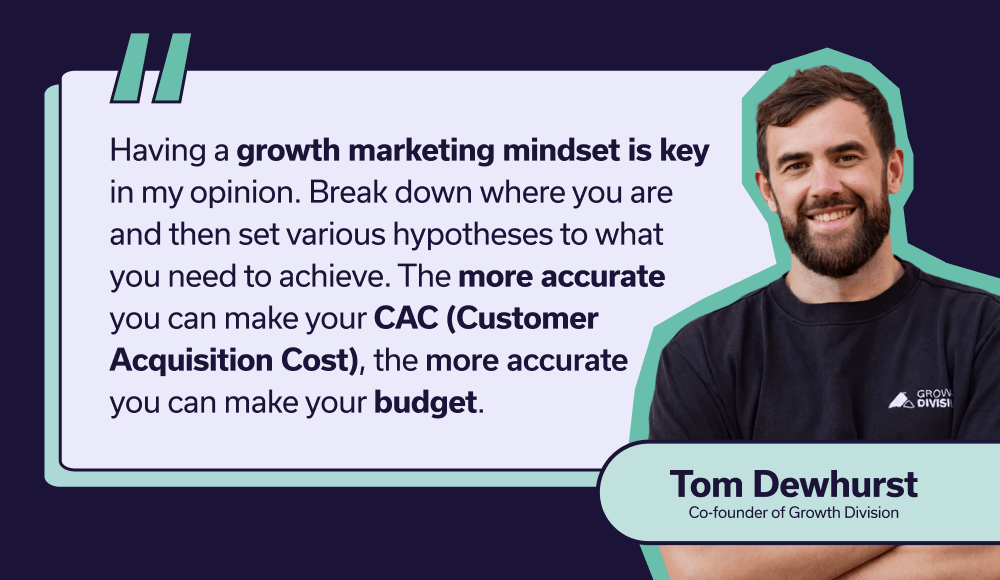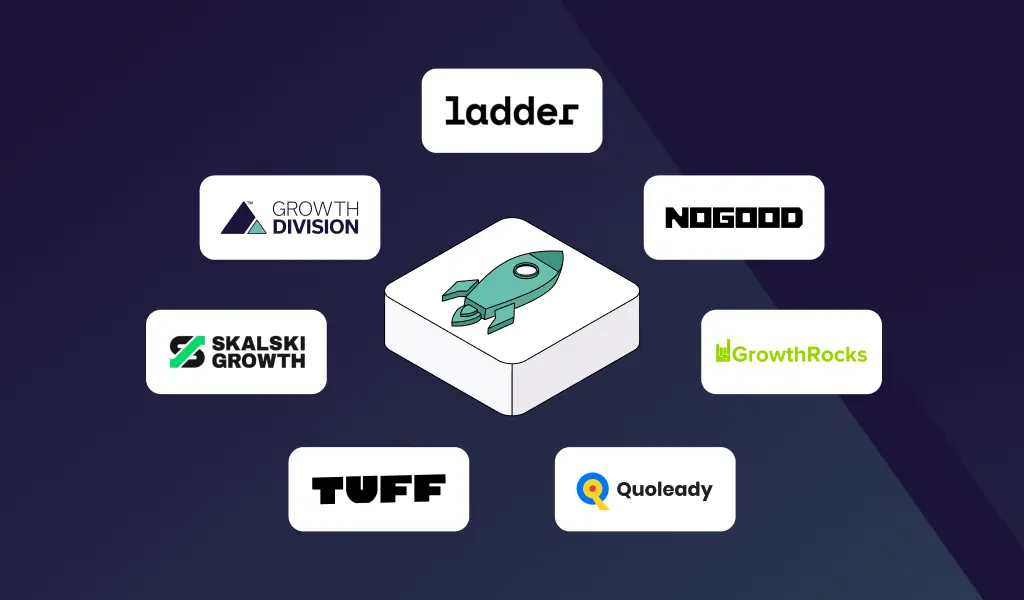As a growth marketing agency for startups we understand that deciding how much to spend on marketing can be extremely difficult. Established companies have the luxury of knowing a great deal about the lifetime value of their customers, the average costs to acquire those customers, and how much market share they have and/or want to achieve. All of these can be plugged into a spreadsheet which can output a sensible marketing budget for the next year.
However, a startup will often not have access to some or all of that data. Therefore deciding how much to spend can involve a lot of guesswork. If you overspend, you’ll use up valuable capital that could be going to product development. If you underspend, you may not grow fast enough to reach profitability or demonstrate the growth you need for further raises.
What is a marketing budget?
First off, it would be helpful to define what a marketing budget is. The word marketing itself is a little vague and can include a lot of different functions, from pricing and promotions to digital asset creation and website building.
We would recommend that your marketing budget includes every cost associated with promoting your business that is not direct sales. That should include website creation, SEO, social media, agency/freelancer retainers, staff costs, media spend, creative/asset production, PR and customer relationship management (CRM).
📕 Up next: Why Cold Outreach Alone Won’t Scale Your Startup (& What To Do Instead) - a guide from our co-founder
Marketing Budget as a Percentage Of Revenue
Some business books will recommend a young company (up to 5 years old) should 20-25% of its budget on marketing. For more established companies, they’ll recommend 10-15% depending on strategic targets. But if you look elsewhere, you’ll see very different percentages - for example, the US Small Business Administration recommends spending 7-5% of revenue on marketing if your total revenue is less than $5m dollars.
That’s a pretty wide margin. How do you pick which percentage to go for?
And what if you’re pre-revenue? You can apply your chosen percentage to your projected revenue from your business plan. But you’re in dangerous territory there - your projected revenue was likely built on some big assumptions, so if you do this you’re applying an arbitrary percentage to an arbitrary revenue figure - the result could be a marketing budget that is wildly out from what real world conditions require.
And what if you have ambitious growth targets you need to hit? Or your competitors are spending far more or less than those percentages? This one-size-fits-all approach then begins to fall apart quite quickly.
Test and learn
One thing we recommend to clients unsure of what to spend is a test and learn approach. Choose one or two channels and assign a disposable testing budget to test on them. This should be small enough that you won’t desperately miss the money if the test fails, but large enough that you can collect enough data to learn from. It really varies per industry, but circa £1.5-2k per month per channel is a good starting point.
If you run three months of proper tests, this should give you far more idea of what your customers are worth, and how much they might cost to acquire them. It’s very important you execute these tests properly to avoid false negatives. For that reason, it’s often best to use specialist consultants rather than a generalist marketer.
If you’ve run these tests well, by the end you should be left with a decent idea of:
- Your average customer acquisition cost (CAC). Even if it’s not a fair average, you’ll have enough info to know what an achievable CAC might be.
- Your average customer lifetime value (LTV). This is the total profit a customer will deliver to you over their lifetime. After some initial tests you should have a better idea of customer order value and behaviour, and make an estimate for LTV.
Armed with these two bits of information, you’ll be able to calculate, rather than guess, a marketing budget.
How to calculate your marketing budget
You’re in luck! We built a marketing budget calculator for exactly this purpose.
With your LTV, CAC and revenue targets you can calculate what your marketing budget should be. We have written about how to calculate your marketing budget here. The general idea is:
- Calculate your projected LTV:CAC ratio.
- Define your growth targets. For example, you might say you want to acquire 50 customers in 24 months.
- Calculate your CAC budget - how much you need to spend to acquire your target number of customers.
- Calculate your loaded marketing budget - this is the cost to acquire customers in terms of channel spend, plus your other marketing costs like salaries. As a rule of thumb, we say double your CAC budget to get an idea of your loaded marketing budget.
- Calculate your monthly marketing budget - divide your loaded marketing budget by your timeframe - 24 months in our above example.
What mistakes do startups make when setting a marketing budget?

With many different variables and approaches at play, setting a marketing budget is no easy task – especially for a startup without much data to fall back on.
Growth Division’s co-founder, Tom Dewhurst, has worked with plenty of startup clients in their early days of growth. He says creating (and sticking to) a marketing budget should be a top priority for all founders – but even with a wealth of experience, he still finds this a challenge.
We asked him what mistakes startups should avoid when setting their budget:
“Having a growth marketing mindset is key in my opinion. Break down where you are and then set various hypotheses to what you need to achieve. The more accurate you can make your CAC (Customer Acquisition Cost), the more accurate you can make your budget”, he advises.
“Once you have a clear idea of CAC, or at least an estimate, you can easily calculate how much you'll need to spend to hit your targets. Then the budget becomes a function of how quickly you want to grow and how much cash you can invest upfront (depending on your business model). More often than not, this number is significantly higher than most founders expect. Be realistic and tweak the model until you feel comfortable fixing a monthly spend for the year.”
How much do startups typically spend on marketing?
As we’ve seen so far, your marketing budget should be tailored to your own business metrics, available cash, and growth targets.
That said, it can still be helpful to hear some rough numbers so you can get a sense of what’s normal here.
Over 100 different business owners and leaders have used our marketing budget calculator to help them set their budgets.
There was a big range of results. But the average (median) budget recommended based on their LTV:CAC calculations, revenue and customer targets was £55,000/month.
How do I get the most out of my marketing budget?
Now, this is a big question. For a marketing budget to be effective you’ll need:
- A solid, well researched strategy. Who you’re targeting, where you’re going to target them, and what your proposition is to them.
- A good channel mix. You need to choose marketing channels that are relevant to your customers without spreading yourself too thin.
- A thorough process of experimentation. You’ll need to be scientific with how you approach marketing tests.
- A great team. You’ll need to be working with expert marketers and channel specialists who can get the most out of the spend allocated to them.
FAQs
What’s the 70:20:10 rule for marketing spending?
The 70:20:10 rule recommends allocating 70% of your marketing budget to proven tactics, 20% to innovation strategies, and 10% to experiments. There are a few variations of this ratio circulating, with a similar split of recommendations.
It’s a good rule of thumb for larger businesses, but startups should spend a greater proportion of their budget on experimentation to find these ‘proven tactics’ to bank on in the future.
What is CAC?
CAC stands for Customer Acquisition Cost. It’s essentially the total amount your business spends to get each new customer, and includes a proportional split of all the costs involved: marketing and sales salaries, advertising, and more.
Where should I start when calculating my startup marketing budget?
We’ve built a marketing budget calculator to support startup founders with exactly this. The calculator takes into account factors including your customer lifetime value, customer acquisition cost, revenue and customer targets to calculate a recommended budget. Treat this as a helpful jumping-off point when setting yours.
Talk to a Growth Advisor
We create a clear, focused marketing strategy by combining our expertise with your knowledge of your business.
Trusted by over 130 startups because our unique growth process and team of marketing experts unlock exponential growth











